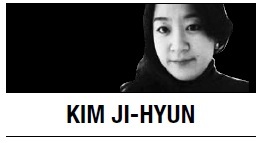Second Opinion
[Kim Ji-hyun] South Korea, it's your good name
 |
Reputation. It’s hard to build, and easy to forfeit.
In fact, it’s one of the most fickle things in the world, especially for public figures who may one day be the public enemy, but the next become thoroughly redeemed with one right move.
Speaking of reputations, one of the world’s most dangerous men lurks above the South Korean border -- North Korean leader Kim Jong-un who is suspected of masterminding the recent murder of his half brother Jong-nam.
The crime, according to many, is interpreted to reflect the young North Korean leader’s anxiety about maintaining authoritarian control by eliminating any variables that may jeopardize his legitimacy. He is also looking for official acceptance from the US and China, and has proven he will go to all lengths to achieve this goal.
Japan, which is looking to continue weaning political and military favors from the US, is naturally going to side with whatever the Trump administration has to say. But the new president has yet to reveal his view on how he would deal with North Korea. China, for once, has shown some backbone by stopping all coal imports from North Korea.
The Asia-Pacific has never had it so dynamic, it seems. But even though South Korea should be one of the main protagonists, it does not seem to have much of a say in these matters. Unless the media is mistaken, Seoul has no more intelligence on North Korean affairs than its neighbors. It also lacks any kind of leverage over the North -- whether political or military.
The situation is largely the same when it comes to our leverage over Tokyo, Washington or Beijing. Toward Washington, Seoul seems to be genuinely at a loss as to how to deal with the new Trump administration. With Japan, I don’t want to make the assumption that relations are at their worst, especially since we all remember how things were when former president Lee Myung-bak made that controversial visit to the Dokdo islets, but things are far from good.
The Japanese press has been spewing out stories about the issue of the comfort girl statue for weeks now, and Prime Minister Shinzo Abe, being the shrewd politician he is, has been using the momentum to urge South Korea to abide by its 2015 deal on the Korean women who were forced into sexual labor by the Japanese. Economic relations between the two sides have reached an unofficial hiatus. Beijing, meanwhile, is keeping the heat on Seoul to force it to withdraw from US-led plans for a THAAD installment in South Korea.
In short, Seoul is being pressured by all of its most powerful political and economic partner nations.
While new strategies and tactics are going to matter, in the long run, it may be an issue of sticking to its guns and building a lasting, formidable reputation to fight longer-term battles.
For instance, we could try sticking to our original promise on the 2015 comfort women deal with Tokyo to show that despite the anti-Japan public sentiment, the government will try to uphold its past promises and keep a level head. This change in our attitude could also be used as a bargaining chip for something else, such as resuming the currency swap deal with Japan.
With such suggestions, I am not siding with Tokyo, and I do not support the principles or spirit of the latest comfort women deal with Japan. What I am saying is that it was a contract of sorts, and Seoul put its signature on the dotted line. The government cannot keep being swayed by public sentiment that is in turn influenced by political headwinds.
How the public feels should have been weighed in before the deal was signed, not after, and not while the country is rocking from ideological battles against the backdrop of a presidential leadership vacuum.
South Korea is still the country that created the miracle on the Han. But at the same time, it has a reputation of being a pot that easily boils over or quickly cools. Koreans, at the same time, are known globally as proud and hot-headed. Catering to such people is certainly a difficult task, and perhaps that’s why politicians and policymakers make comments such as, “Seoul won’t act first in getting Tokyo to resume the currency swap deal.” Such words may appease the public, but they are far from being in the national interest.
Some diplomatic situations do demand a firm hand. But in most cases, such attitudes tend to weaken a country’s leverage in global relations, especially if the tactics are deep-rooted and go on to define that nation’s reputation.
By Kim Ji-hyun (jemmie@heraldcorp.com)








